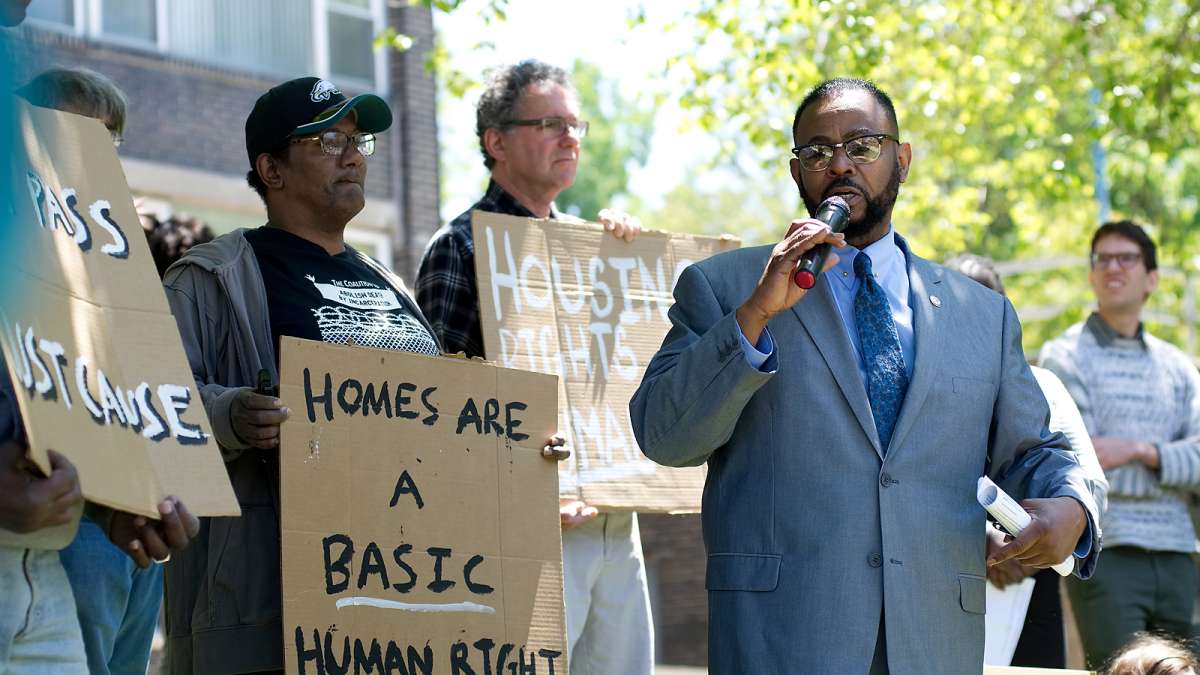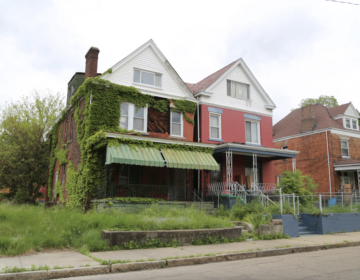City gets behind ‘good cause’ eviction law, but with some reservations about next steps
The “good cause” eviction bill requiring landlords to have a reason — such as non-payment of rent — for ending a month-to-month lease.

Councilman Curtis Jones, Jr. speaks at an anti-eviction rally, organized by the Philadelphia Tenants Union. (Bastiaan Slabbers for WHYY)
The mayor’s reception room hosted an array of Philadelphia politicians and housing activists Tuesday afternoon, all of whom promised to fight for renters’ rights.
The details, however, varied significantly, depending on who was standing in front of the microphone.
The mayor, City Council members and activists had all come together to celebrate the signing of the “good cause” eviction bill requiring landlords to have a reason — such as non-payment of rent — for ending a month-to-month lease.
“This ‘good cause’ bill is all about making sure landlords aren’t treating renters unfairly,” Mayor Jim Kenney said. “Housing is a human right, and my administration will keep fighting to make sure every Philadelphian has a safe and secure place to call home.”
The Philadelphia Tenants Union began pushing for the bill in early 2017. That October, Councilman Curtis Jones introduced a version that would have applied to all leases. As negotiations dragged on, the bill languished for more than a year, until Jones significantly reduced the measure’s scope by having it apply only to month-to-month leases.
Tenants Union activists argued that the downsized bill merely represented a beginning. They came to Tuesday’s press conference bearing signs that read, “A FIRST STEP.”
The group’s next legislative goal is to win funding for a “right to counsel,” which would guarantee that every low-income renter who ends up in eviction court can receive legal representation. Data from 2017 show that more than 80 percent of city landlords had lawyers while less than 10 percent of the tenants had representation.
Several other major cities have agreed to fund right-to-counsel, including New York and San Francisco. The Philadelphia Bar Association last year estimated it would cost $3.5 million annually to fund such a program fully in the City of Brotherly Love. Advocates have suggested that the $53 million the Kenney administration allocated to the housing trust fund last year could hold part of the answer.
Councilwoman Helen Gym is a major proponent of the right-to-counsel proposal. But she said the city might not have to provide all the funding.
“I don’t think it all has to come from the city, it can come from other partnerships or opportunities through the private sector or the Bar Association,” said Gym. “Housing insecurity puts tremendous costs on the education level and on the health level. If there are partnerships we can build in those [sectors], that’s what we will be looking for as we expand right-to-counsel.”
Councilman Jones expressed support for right-to-counsel, but he reiterated his long-standing opposition to rent regulations. That elicited groans from tenants activists in the audience.
“We look forward to campaigns for right-to-counsel and even rent control,” said Jarrett Smith, a tenants union member who led the campaign for the good-cause bill. “We know that even with today’s handshakes and photo opps we will soon have to challenge our City Council and candidate hopefuls once again.”
Also attending the signing were Councilwoman Cherelle Parker and Councilman Allan Domb, who is one of the city’s most prominent real estate brokers. Domb blanched at the mention of rent control, but he said he supported the concept of right-to-counsel.
On his way out the door, Kenney said his administration was in negotiations with Community Legal Services, a civil legal-aid firm, about right-to-counsel funding.
“The conversation about rent control continues to pop up, and certainly we are open to listening,” the mayor said. “The way in which our neighborhoods are gentrifying now really does call for additional action to keep people safe in their rental properties, as opposed to being forced out by gentrification.”
WHYY is your source for fact-based, in-depth journalism and information. As a nonprofit organization, we rely on financial support from readers like you. Please give today.







